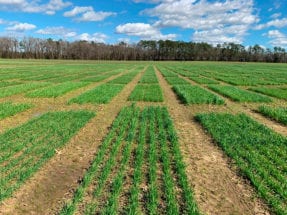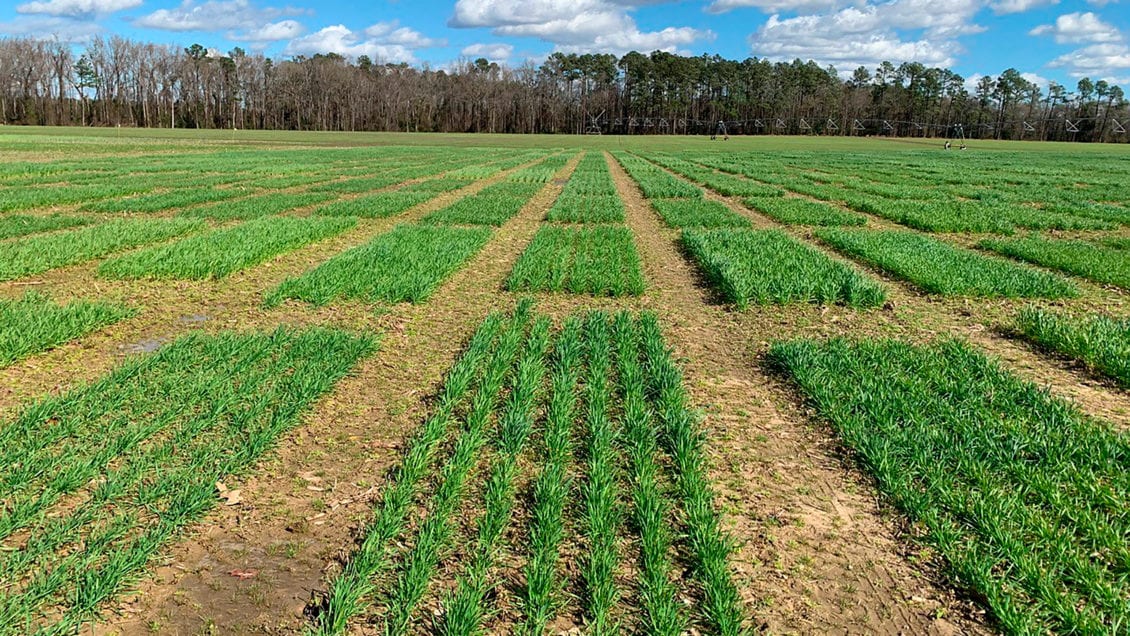FLORENCE, S.C. – Year-to-year weather variability is creating challenges for wheat growers, and Clemson University researcher Rick Boyles is working to determine how to develop new wheat lines that can withstand environmental changes and produce under tough conditions.
Part of his plan includes developing a new line of soft winter wheat. But this could take years. To help move things along, Boyles, an assistant professor of plant breeding and genomics and head of the Cereal Grains Breeding and Genetics Program at Clemson’s Pee Dee Research and Education Center (REC), has received a grant from the United States Department of Agriculture National Institute of Food and Agriculture (USDA-NIFA) to study ways to incorporate genomics into wheat development for the southeastern United States.

“In this project, we will focus on selecting wheat for broad adaptation across a range of locations and environments to provide exceptional yield potential and stability,” Boyles said. “Environments across the greater southeastern United States seem to experience more severe and fluctuating weather, which makes breeding wheat that can sustain these conditions all the more critical.”
Boyles will leverage a deep base and wide range of elite wheat genetics through the Southeastern University Small Grains Cooperative Breeding Program (SunGrains). Clemson formally rejoined this cohort of land-grant research universities in September 2020.
SunGrains allows for the distribution and open sharing of genetic materials, or germplasm, researchers can use to breed for new and improved lines of small grain cultivars.
The long-term goal is to produce more efficient cultivars that can be grown throughout the southeastern United States.
“The challenge for a project such as this is selecting the appropriate genetics that will allow for the development of a superior line of wheat that can be grown in the southeastern United States,” Boyles said.
The SunGrains program brings together small grains programs from member universities across the greater Southeast region — University of Arkansas, University of Georgia, University of Florida, North Carolina State University, Louisiana State University, Texas A&M University and, now, Clemson — to maximize funding and research opportunities and share resources and royalties. During the study, Boyles will work with researchers at these land-grant universities in their respective states.
“Locations for the study in the states were strategically chosen to represent major, yet environmentally different, wheat production areas in the southeastern United States,” Boyles said.
The grant Boyles received is one of 22 plant breeding research projects the USDA has invested more than $8.65 million through its Plant Breeding and Agriculture Program. Other universities in the southern/southeastern United States that received funding for related projects include Louisiana State University, North Carolina State University and Texas A&M University.
“These innovative projects will advance crop production efficiency, healthfulness, product quality and the value of U.S. agricultural plants while increasing farmer profitability and sustainability,” said NIFA director Carrie Castille.
Sustaining agriculture for the future
Boyles’s project addresses priorities listed in the USDA’s A1141, Plant Breeding for Agricultural Production Program including improvement of crop productivity, quality and performance in local and regional production environments; combining conventional and genomics-enabled breeding for applied cultivar development; and increasing crop resiliency via selection of lines with elevated yield stability under stress and more durable disease and pest resistance.

The A1141 program is one of the USDA’s Plant Breeding, Genetics and Genomics Programs that focus on producing more food with less impact on the environment. The need for developing crop cultivars with greater resiliency stems from an increase in seasonal weather variation and in the number of extreme weather events (hurricanes, flooding, etc.) that are not conducive for growing wheat.
“Environments in the region seem to experience more severe and fluctuating weather, which makes breeding wheat that can sustain these conditions all the more critical,” Boyles said. “We are seeing emergence and prevalence of fungal disease that demand breeders develop wheat cultivars with genes that provide host plant resistance.”
Wheat is grown from November to June in South Carolina, which means it spends a long time in the field and exposed to natural weather events. Periods with high rainfall in the winter or dry, hot spells in the spring are a couple of examples of adverse conditions that can negatively affect the wheat crop. Unfortunately, many growers in South Carolina experienced both of these in the 2020-2021 growing season.
Information from the South Carolina Department of Agriculture shows wheat is an important row crop in South Carolina, contributing to the $41.7 billion a year impact agriculture has on the state. Nathan Smith, director of the Clemson Cooperative Extension Service agribusiness team, said 60,000 acres of winter wheat were planted in South Carolina in 2016; 90,000 acres in 2017; 80,000 acres in 2018; 70,000 acres in 2019; 110,000 acres in 2020; and 130,000 acres in 2021.
-END-
This study is funded by the United States Department of Agriculture National Institute of Food and Agriculture (USDA-NIFA) CU Award Number 2021-67014-33941. Any opinions, findings, and conclusions, or recommendations expressed in this material are those of the authors and do not necessarily reflect the views of the USDA-NIFA.
Get in touch and we will connect you with the author or another expert.
Or email us at news@clemson.edu

